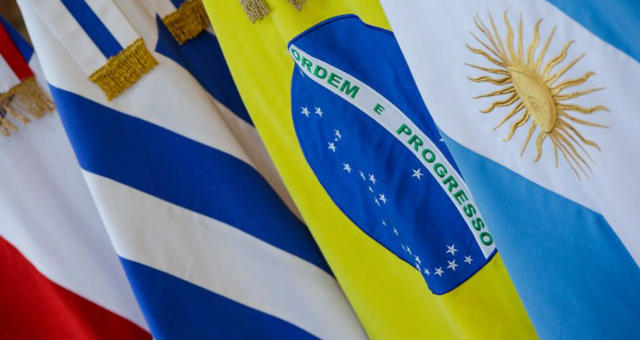
Mercosur’s appetite for trade agreements is up
Potential trade partners are looking for Mercosur after a broad agreement with the European Union showed that the majority of the members of the Southern cone are open to negotiation, according to Uruguayan Foreign Minister Ernesto Talvi.
At least four countries, including some “very important” economies, have recently signaled to Uruguay that they want to explore trade negotiations with Mercosur, Talvi said in an interview on March 5 in Montevideo. He declined to identify the countries because the meetings were confidential.
By signing an agreement with the EU last June, Mercosur signaled that it is serious about its intention to play a greater role in the global economy. The diversification of trading partners is a growing need, as Chinese demand is hit by the coronavirus epidemic.
“The Mercosur brand has been greatly valued because we have started to show that we wanted to integrate and open ourselves by signing cutting-edge free trade agreements,” said Talvi. The minister took office on March 1, when President Luis Lacalle Pou began a five-year term.
Mercosur diplomats are focused on negotiating with South Korea, Canada and Singapore, while Indonesia and Vietnam are possible candidates. In addition, an agreement with the European Free Trade Association – the bloc representing Switzerland, Norway, Iceland and Liechtenstein – is in the final stages.
Flexibility
Talvi attributed the recent willingness of Mercosur to seek trade agreements to a growing perception among the Brazilian business community that greater access to the foreign market is essential for its survival. “My perception is that three countries – Brazil, Paraguay and Uruguay – have decided for a dynamic and rapid global insertion.”
“Argentina, for the time being, is very conditioned by short-term problems,” he added. Argentina’s economy, the second largest in South America, is expected to shrink for the third consecutive year amid double-digit inflation, capital controls and complicated renegotiation of government debt. Argentine companies and politicians are also reluctant to open the economy, one of the most closed in the world, at a time of high unemployment.
Talvi highlighted the pact with the EU as an example of how the bloc can adapt trade agreements to the needs of its member countries. Once ratified by the EU, the treaty will enter into force on a bilateral basis between the EU and each Mercosur nation that has approved it. “It is a very important element of flexibility,” said Talvi. “We don’t move at the speed of the slowest country. Those in a hurry can move more quickly.”
Uruguay wants to modernize Mercosur with measures to facilitate trade and supply chains within the bloc when it holds the rotating presidency of the organization during the second half, said Talvi.
Uruguay depends on export markets to sell the vast surplus of soy, beef and dairy that its domestic market of just 3.5 million people cannot absorb. However, exports fell 13% in the first two months of 2020 compared to the previous year, to $ 1.17 billion, due to the slow economic recovery in Brazil and the coronavirus epidemic in China.
This is bad news for the Lacalle Pou government, which faces the challenge of boosting the economy that has eliminated more than 50,000 jobs since 2014. Analysts expect GDP to grow 1.5% this year and 2% in 2021, according to data compiled by Bloomberg.
Without other trade agreements, Uruguay risks losing not only access to the main export markets and jobs, but also social cohesion as rural unemployed migrate to cities, Talvi said. Trade promotion “is an absolutely fundamental strategy, not only in economic terms, but for the reconstruction of our social fabric”.
Source: economia.uol.com.br